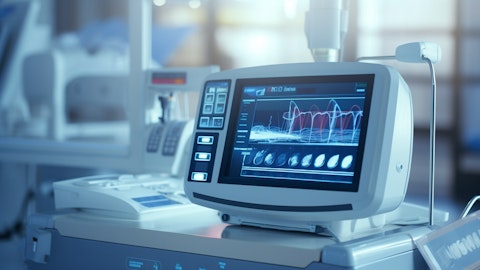Sidus Space, Inc. (NASDAQ:SIDU) Q1 2025 Earnings Call Transcript May 15, 2025
Operator: Greetings and welcome to the Sidus Space First Quarter 2025 Results Conference Call. [Operator Instructions]. It is now my pleasure to introduce Adarsh Parekh, Chief Financial Officer. Please go ahead.
Adarsh Parekh: Good evening everyone and thank you for joining us for Sidus Space’s 2025 first quarter earnings conference call. Joining us today from the company is Carol Craig, Chairman and Chief Executive Officer and myself Adarsh Parekh, Chief Financial Officer. During today’s call we may make certain forward-looking statements. These statements are based on current expectations and assumptions and as a result are subject to risks and uncertainties. Many factors could cause actual results to differ materially from the forward-looking statements made on this call. These factors include our ability to estimate operational expenses and liquidity needs, customer demand, supply chain delays including launch providers and extended sales cycles.

For more information about these risks and uncertainties please refer to the risk factors in the company’s filings with the Securities and Exchange Commission, each of which can be found on our website www.sidusspace.com. Listeners are cautioned not to put any undue reliance on forward-looking statements and the company specifically disclaims any obligation to update the forward-looking statements that may be discussed during this call. At this time I would like to turn the call over to Carol. Carol, please go ahead.
Carol Craig: Thank you, Adarsh, and welcome everyone to the first quarter 2025 earnings call. On today’s call I’ll outline our key accomplishments during Q1 and Adarsh will present the financial highlights. I’ll then share our outlook for Q2 and beyond. The first quarter of 2025 marked another major step forward in Sidus Space’s evolution toward becoming a vertically integrated, diverse, multi-domain service provider, while our current operations remain space focused. We’re preparing to scale our capabilities across air, sea, and terrestrial environments, powered by a new generation of rugged dual-use technologies that will redefine how missions are executed in challenging domains. Our mission has always been to deliver reliable, scalable, and intelligent solutions from initial design through full deployment and our smart vertically integrated model along with our innovative culture continues to be our strategic advantage.
It allows us to innovate faster, control quality across the product lifecycle, and bring advanced technologies to market more efficiently than traditional aerospace providers. In Q1 we celebrated a major achievement with the successful launch of LizzieSat-3 on March 14th. This marks our third satellite and another step in building a fully operational data generating micro constellation. We’re currently completing satellite commissioning for LS3 and successfully demonstrated operation of our advanced onboard edge computer FeatherEdge Gen 2. Additionally, we’ve successfully established communications to the first of our customer payloads. Once fully online, LS3 will expand our ability to deliver near real-time Earth observation data and onboard AI processing, unlocking a new revenue channel via data-to-service offerings to commercial and government users.
Q&A Session
Follow Sidus Space Inc. (NASDAQ:SIDU)
Follow Sidus Space Inc. (NASDAQ:SIDU)
Receive real-time insider trading and news alerts
This transition from development to commercialization is foundational to our 2025 growth strategy. One of our most exciting developments is the Sidus Orlaith AI ecosystem, a modular pairing of our FeatherEdge hardware and our Cielo software. Orlaith is built for near real-time autonomous decision-making and can be configured for various mission types from maritime situational awareness to orbital asset monitoring. This AI ML algorithms support in-orbit reconfiguration, enhanced anomaly detection, and near real-time data processing, creating efficiencies and resilience in even the most extreme environments. This quarter marked the start of a strategic soft launch of several Sidus developed technologies designed for dual-use applications, systems engineered not only for space but ruggedized for air, land, and maritime environments.
Our goal is to bring true multi-domain interoperability to market beginning in 2025, enabling customers to deploy integrated systems across platforms without the need for redesign or re-engineering. A cornerstone of this rollout is the Sidus single board computer, which is a SOSA-Aligned, OpenVPX-based computer. Built for mission-critical environments, SSBC supports applications ranging from on-orbit to terrestrial command and control, including sensor fusion. In Q1, we focused on the launch and commissioning of LizzieSat-3 while laying the groundwork for this product rollout, which we expect to expand into defense and military markets in Q2. Early customer engagements have been positive with strong interest and encouraging feedback. Our pipeline continues to gain momentum, underscoring the strategic relevance of these offerings.
This rollout supports our broader objective to diversify both our technology portfolio and addressable markets. As we scale production and enhance capabilities, we expect our command-and-control product line to be a key growth driver in the coming quarters, positioning Sidus as a leader in delivering integrated, real-world, multi-domain solutions. The next phase in our multi-domain technology roadmap reflects our commitment to developing breakthrough innovations that not only meet existing requirements but also open the door to entirely new market opportunities. Importantly, these advanced capabilities are being deployed not only on our proprietary LizzieSat platforms, but also on customer satellites, including those being developed for Lone Star Holdings.
These efforts reinforce our three core pillars; technology, AI, and space by expanding our AI-driven solutions and mission-critical space services that address today’s operational needs while anticipating tomorrow’s challenges. We’re actively bringing our VPX social line space hardware into full production and commercial deployment and enabling scalable satellite and data architectures that meet the demands of both government and commercial customers. And further supporting this evolution is the advancement of our LM Flatsat, the adaptable LizzieSat engineering model, which is a lab-based integration and testbed platform designed for next generation technology demonstrations. LM provides a flexible environment to validate new systems, accelerate development cycles, and de-risk future mission configurations, which is vital for a long-term scale-up strategy.
These innovations represent a key part of our 2025 roadmap and reflect our commitment to designing once, deploying anywhere, accelerating mission readiness while reducing cost and complexity. Our work with Lone Star Holdings continued this quarter. We amended and extended our agreement, bringing the total potential contract value to $120 million. And while revenue recognition has not yet begun, this agreement provides strong visibility and underpins confidence in our commercial roadmap. Additionally, our platforms and products are being used on both Sidus own and customer spacecraft, extending our reach and opening doors to licensing and service revenue models. From a business development standpoint, we made meaningful strides. We deployed Orlaith in Asia, strengthening global AI and analytics reach.
We deepened our partnership with Little Place Labs to enable near real-time maritime domain awareness via LizzieSat. And we signed an MOU with international partner Reflex Aerospace to explore joint constellation services. Recently, we received a notice of allowance for our modular satellite testing platform, a patent that safeguards the intellectual property behind our adaptable and scalable satellite architecture. This milestone reinforces our vertically integrated model and preserves the flexibility needed to meet evolving mission demands. Our patent portfolio represents more than just innovation. It’s a strategic asset that unlocks future licensing, protects differentiation, and enhances customer confidence. In highly regulated markets, this IP framework is critical to accelerating commercial and defense adoption of our technologies.
We believe that a well-established patent portfolio provides us significant barriers to entry, ensuring we can protect our proprietary solutions while enabling strategic partnerships, licensing opportunities, and future product development. It also reinforces customer confidence, particularly in highly regulated or mission-critical industries where reliability, security, and innovation are essential. Looking ahead, our focus remains on completing LS3 commissioning, expanding commercialization of LizzieSat-enabled services, and securing our first product orders across our VPX SOSA-Aligned systems. These efforts reflect the shift from technology development to revenue generation. We believe the groundwork laid in Q1 positions Sidus to begin realizing material revenue growth in the second half of the year.
We’re also closely monitoring opportunities related to U.S. manufacturing incentives and increased allied defense spending, particularly in Europe. These trends align well with our dual-use strategy and ability to scale rugged, multi-domain technologies from our U.S.-based facility. In summary, Sidus is entering the next phase of our journey. Our infrastructure is built, our products are in the market, and our partnerships are advancing. We’re not just enabling missions. We’re reshaping how they’re designed, deployed, and executed across every domain. And now I’ll turn it over to Adarsh for final highlights.
Adarsh Parekh: Thank you, Carol. At Sidus, we continue to build a scalable, vertically integrated company across space, technology, and artificial intelligence. Our focus remains on operational excellence, rapid innovation, and delivering cost-effective, high-impact solutions for our customers. Our investments to date have centered around expanding our satellite constellation, advancing innovation, and implementing a robust ERP system to support scale and profitability. As Carol has noted, 2024 was a foundational year for Sidus, one in which we validated our core technologies, grew our customer base, and secured critical strategic partnerships. That momentum has carried into the first quarter of 2025, which reflects both our transition to commercialization and the near-term financial impacts of scaling a deep-tech, space-based enterprise.
Let’s review our first quarter results. Total revenue for the three months ended March 31, 2025, was approximately $238,000, a decrease of $812,000, or 77%, compared to Q1 2024 revenue of $1.05 million. This decrease was expected and primarily driven by the timing of fixed price milestone contracts and our intentional shift away from legacy contract work to focus on commercial, space-based, and AI-driven solutions. Cost of revenue for Q1 2025 increased 93% to approximately $1.9 million, compared to $966,000 in Q1 2024. Key drivers included satellite and software related depreciation increase of $611,000, a mix of contract types with higher material and labor inputs, and continued pressure from global supply chain costs in our manufacturing operations.
Depreciation will continue to impact cost of revenue until we generate satellite and data related revenues, which have higher margins to offset the related depreciation expense. Gross profit for Q1 2025 was a loss of $1.6 million, compared to a profit of $84,000 in Q1 2024. This reflects increased depreciation, a shift in contract mix, and reduced contribution from legacy high margin services as we transition to higher value recurring revenue lines. Selling, general, and administrative expenses totaled approximately $4.4 million, up from $3.6 million in the same period last year. This $800,000 increase was driven by increased headcount and associated benefits to support growth, equity-based compensation and employee bonus accruals, severance and rebooking fees related to launch schedule adjustments, debt payoff related expenses, and 24-7 mission operations expenses related to supporting multiple satellites on orbit.
To provide investors with additional information in connection with our results as determined in accordance with GAAP, we also include in our 2025 Form 10-Q non-GAAP measures to determine our adjusted EBITDA. We use adjusted EBITDA to evaluate our operating performance and make strategic decisions about the company’s future direction. Adjusted EBITDA loss, a non-GAAP measure for the three months ended March 31, 2025, totals $4.7 million. As compared to an adjusted EBITDA loss of $2.7 million for the same period the prior year, which represents a 75% increase in the loss. Total non-GAAP adjustments for interest expense, depreciation and amortization, fundraising expenses, severance costs, and equity-based compensation are provided in the reconciliation table listed in our first quarter 2025 earnings press release released earlier today.
Net loss for the three months ended March 31, 2025, was $6.4 million, compared to a net loss of $3.8 million in the same quarter of 2024. As discussed, the increase is attributable to depreciation, scaling costs, and our shift to long-term higher margin business models. Turning to the balance sheet, as of March 31, 2025, we had $11.7 million in cash, compared to $6.2 million as of March 31, 2024. In Q1, we also fully paid off our loan with Decathlon Alpha IV LP, a key milestone in strengthening our balance sheet and improving financial flexibility. As we move forward, we are managing cash conservatively while making strategic investments in our next-generation satellite builds and high-growth product lines. We are also actively pursuing further cost optimizations and operating efficiencies to support long-term profitability.
With that, I’ll hand the call back to Carol for closing remarks.
Carol Craig: Thank you, Adarsh. As you heard today, Sidus is in the midst of a pivotal shift from R&D and infrastructure build-out to commercialization and revenue generation. We’ve successfully launched and have begun commissioning our third satellite, laid the foundation for a scalable micro-constellation, and introduced a new generation of rugged dual-use technologies. While Q1 reflects the near-term financial impact of that transformation, we are confident in our long-term trajectory. We’ve strengthened our balance sheet, launched high-potential new platforms like Orlaith, and are poised to generate revenue from diversified initiatives in the second half of the year. The path we’ve chosen is ambitious, but it’s the right one for unlocking meaningful, sustainable growth. Most importantly, I want to thank our employees, our partners, and our shareholders for your continued trust and support. We look forward to delivering strong progress in the months ahead.
Operator: Thank you. This does conclude today’s teleconference. We thank you for your participation. You may now disconnect your lines.
Follow Sidus Space Inc. (NASDAQ:SIDU)
Follow Sidus Space Inc. (NASDAQ:SIDU)
Receive real-time insider trading and news alerts



